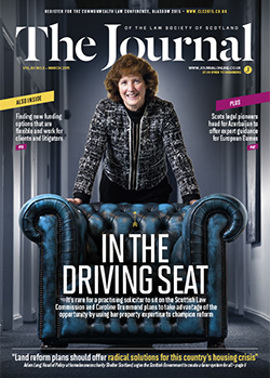Reading for pleasure
The Girl Who Wasn't There
Ferdinand von Schirach (Little Brown: £12.99; e-book £9.09)
Ferdinand von Schirach wrote the superb Collini Case, which was published to acclaim in September 2012. This book is equally worthy of high praise and is a superb read.
Sebastian von Eschburg has a dreadful childhood in a large lonely house. However, as we follow his early years, he becomes one of Germany's most celebrated conceptual artists, creating images of women that are at times disturbing; at others, installation art of a kind that is simply prophetic. He finds himself charged with murder, although only a dress is recovered. The woman who rented space in the building which houses his studio cannot be traced. The investigation begins and there is a clear suggestion of impropriety by the police. The trial takes place and von Schirach, one of Berlin's best known defence lawyers, writes superbly and forensically of the evidence – or is it? To say more would spoil the story. However the writing is clear, engaging and utterly compelling.
For those who follow case law of the European Court of Human Rights, one can see shades of Gäfgen v Germany, a decision of the Grand Chamber of 1 June 2010, where "the applicant alleged that the treatment to which he had been subjected during police interrogation concerning the whereabouts of a boy, J, on 1 October 2002 constituted torture prohibited by article 3 of the Convention". A riveting, intelligent, thoughtful read, most enjoyed perhaps at one sitting.
The Churchill Secret KBO
Jonathan Smith (Abacus: £9.99; e-book £4.49)
This is an immensely enjoyable book of the reimagined events within Chartwell, when Churchill found himself having suffered a stroke while his Foreign Secretary, and anxious successor, Anthony Eden, was flown to the United States for surgery in the summer of 1953.
The author shows us the anxiety and concerns of both the formidable Lady Churchill and of the great leader himself about whether this would see him off. There is a small but lively cast of characters, from Lord Moran, Churchill's personal physician, to his private secretary, to caustic Sir Jock Colville. The tensions between the politics and the medical reality are laid bare. However, the ability of the press to be aware of, but report nothing of, the illness and the concerns of who was running the country – or might in future – is of times long past.
The author captures the spirit of Churchill – cantankerous, witty, a polymath, a gentle bear, beautifully. One almost feels as if one is standing in the room. Topping it all is Churchill's nurse, who with care and forbearance nurses the great man back to health and simply slips away back into her daily routine, unfazed but content with her secret. A joy to read.
The Alphabet of Birds
S J Naudé (And Other Stories: £10)
There is much fine writing coming out of post-apartheid South Africa. The appearance of much of that is down to publishers And Other Stories, a not-for-profit, community interest company. Sign up and you too could be namechecked in a future book.
If that book were to be anything like as fine as Naudé’s collection of short stories, you would be proud to have the association. Naudé was lawyer who practised in London and the USA before returning home to do a Masters degree in creative writing. While this book is his first published work, it is clear he has been practising his craft for many years: this is no novice work.
We start in the surreal setting of a Milanese mansion so luxurious it is hidden within an industrial complex, the drama focusing on the last known futurist noise machine. Other settings include a semi-ruined castle in Bavaria, and a scene of domestic misery overlooking an indoor ski slope in Dubai. The links and the contrasts between Naudé’s backdrops, and the characters and their actings, are some of the book’s most striking features.
Prospective readers should be warned about the bleakness of the world they are about to enter. Think Leonard Cohen without the "Hallelujah", think Naudé. Your brain will have images emblazoned on it for some time to come. On occasions he overdoes the dark. Why read “Mother’s Quartet” when you could simply slit your wrists without paying the price of the book? But that is the exception. Your senses are assaulted: sometimes by the characters (the charismatic Joschka from “A Master from Germany”, or the almost insanely saintly Sandrien from “Van”); at other times by the sight or smell of the landscapes.
Lyrical, powerful and intensely moving. You will not readily forget this book.
In this issue
- Structured settlements: worth a look?
- Unfairness defined
- Our digital afterlife
- Powers of attorney: full instructions?
- Writings redefined
- Reading for pleasure
- Opinion: Adam Lang
- Book reviews
- Profile
- President's column
- Roll up to register
- People on the move
- Tax plan's on track
- Lease of life
- No win, no fee: no problem?
- Ready to go to court?
- Taking on the expert
- Pensions: keep up with the shake-up
- Equity investment and law firm funding
- Entitled to rely
- See-through setups
- Copyright: defining the boundaries
- Tenancies: the shape of things to come?
- A career taking off
- The system is sound, but...
- Law reform roundup
- Obituary: Leslie Cumming
- From the Brussels office
- From the Clyde to the Caspian
- Some common misconceptions
- Ask Ash
- Mediation: new options
- ABS: time to accept the evidence
- It is OK to change your mind
- Sizing up the class of 2018






